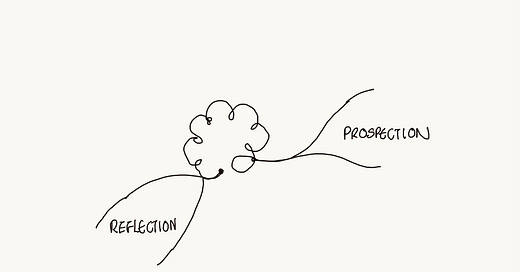Rethink: How to stop constantly thinking about the next thing
On ‘nexting’, prospection and voyaging through time
Dear Rethinkers,
Firstly, a warm welcome to lots of new subscribers this month. I’m delighted that you have joined our thoughtful Rethink community. Please say hi and introduce yourself here.
At a show on a recent tour, musician John Mayer said something powerful to the crowd. “I wait for most things to be over. I wait for this to be over to do the next thing and the next thing and the next thing and the next thing. I have 45 years behind me of waiting for things to be over.” Do you relate to this feeling? I do a lot of that, ‘nexting.’ (Not to be confused with ‘sexting’ 😊)
A recent study by Harvard University psychologists Matthew Killingsworth and Daniel Gilbert revealed that we spend almost 47% of our waking hours thinking about something other than what we’re doing.
“A human mind is a wandering mind, and a wandering mind is an unhappy mind. The ability to think about what is happening is a cognitive achievement that comes at an emotional cost.” — Killingsworth & Gilbert.
Planning, daydreaming, predicting, worrying, reflecting, or anticipating add up to time we spend thinking about what isn’t going on around us.
Contemplating or re-experiencing events that have happened in the past = retrospection.
Thinking about what might happen in the future = prospection.
The part I find interesting is that animals can mull over events they’ve experienced before. But only humans can think about the possible consequences of future events they’ve never experienced by stimulating the future in our minds. We are unique voyagers through time.
Read on to find out the new rule Mayer introduced into his life to counter mind-wandering.





